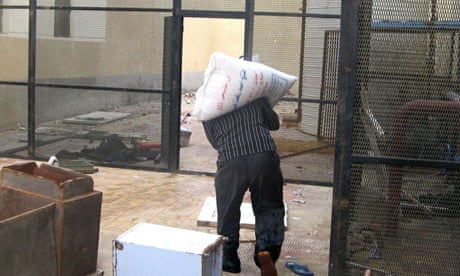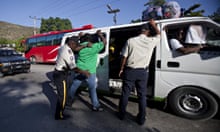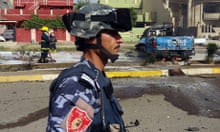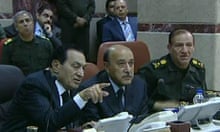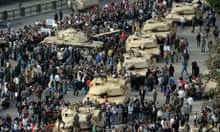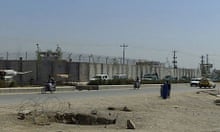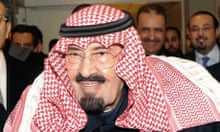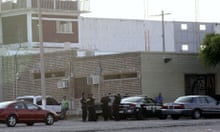Hundreds of members of the banned Muslim Brotherhood, Egypt's leading Islamist political party, were among thousands of prisoners who escaped during overnight mass breakouts from four jails, security officials said today.
Armed gangs took advantage of the chaos in Cairo and other cities to free the prisoners, starting fires and engaging prison guards in gun battles, officials said. Several inmates were reportedly killed during the fighting and some were recaptured.
Abdel-Monaem Abdel-Maqsoud, a lawyer representing the Muslim Brotherhood, said 34 members were arrested and taken to a prison north-west of Cairo ahead of last Friday's mass protests. All 34 got away last night, he said, including seven senior leaders.
The organised attacks and dramatic escapes highlighted growing fears in Egypt, the US, and across the Arab world that militant Islamist groups, backed by hardliners in Iran and Syria, may seek to exploit regional unrest – and resulting government weakness – to increase their influence.
In a sign of how conventional Arab politics is being turned on its head, thousands of Tunisians turned out today to welcome home an Islamist leader exiled for 22 years by the deposed regime of President Zine al-Abidine Ben Ali.
The reception for Sheikh Rachid Ghannouchi, the leader of the Ennahda party, at Tunis airport was the biggest showing by the Islamists in two decades, suggesting that Islamist groups may play a big part in the country's future governance.
Speaking in Tehran, Ayatollah Seyyed Ahmad Khatami, a senior pro-regime cleric, gave Iran's official blessing to the Egyptian demonstrators, saying they wanted a new Middle East based on Islamic values, following Iran's example. "An Islamic Middle East is taking shape. A new Middle East is emerging based on Islam ... based on religious democracy," he said.
Ali Larijani, the speaker of Iran's parliament and a former national security chief, accused the US of trying to thwart demands for reform. "The Americans can tolerate seeing blood shed in Egypt but not see a regime fall in Egypt into the hands of the people," he said.
But while the president does not want to appear to be propping up the old order, officials indicated he was worried a new government dominated by the Muslim Brotherhood or other Islamist groups might not honour the treaty with Israel.
The foreign secretary, William Hague, said it was not up to foreigners to decide who runs Egypt. But he added: "Certainly we would not want to see a government based on the Muslim Brotherhood."
Islamist leaders say such fears are misplaced and indicative of western misunderstandings about the organisation and like-minded groups.
The Muslim Brotherhood's Kamel el-Helbawy told Reuters that Islamist rule in Egypt would pose no threat to the west because it would be more democratic and broad-based than Mubarak's "dictatorship".
"A new era of freedom and democracy is dawning in the Middle East and Arab world. That's more important than declaring that a 'new Islamist era is dawning', because I know Islamists would not be able to rule Egypt alone. We should and would co-operate – Muslims, leftists, communists, socialists, secularists," he said.
"Dictators like Mubarak have always told the west, wrongly, there is no difference between Islamists like the Brotherhood and some violent groups who are real fundamentalists.
The west is always afraid that if the Brotherhood came to power it would end freedoms or do something [negative] with Israel. But I stress that the Brotherhood are among the people who defend democracy in full, and like to see democracy prevailing, because democracy gives them some of their rights."
The Brotherhood has said it would put the Camp David peace accords with Israel to a referendum if it took power.
